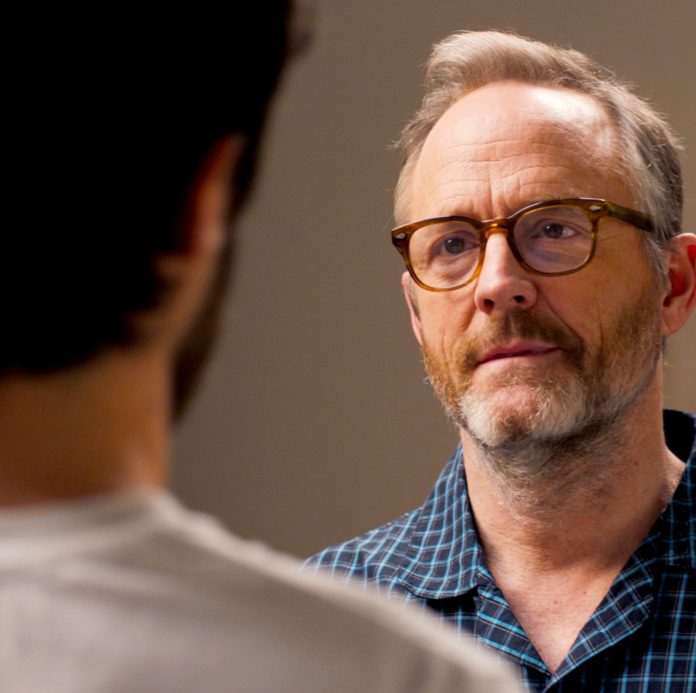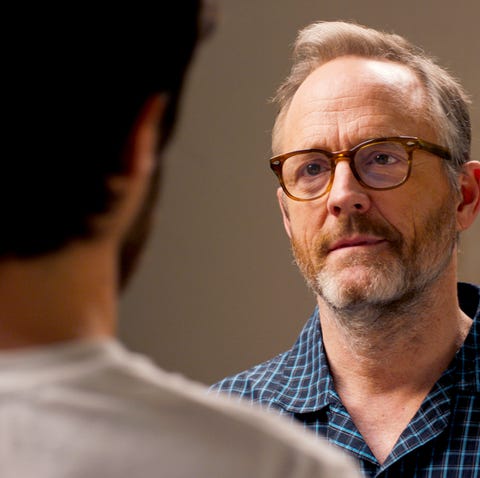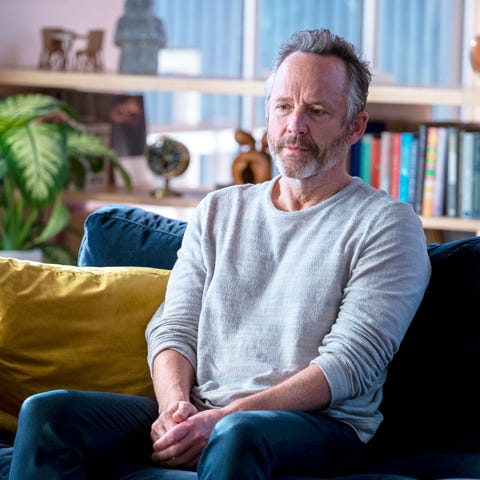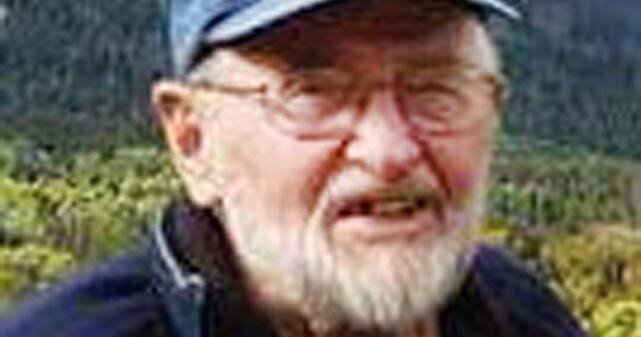It’s the Friday of what, in a normal year, would be Pride Weekend in John Benjamin Hickey’s adopted home of New York City. This year, there’s no parade, no dance on the Chelsea Piers, no big official events sponsored by Absolut Vodka and T Mobile like we’ve had since the ‘90s. Instead, it’s an unorganized city-wide party; people can mix again, bars have reopened, Britney seems tantalizingly close to being freed, the mood is celebratory even if things are not yet normal. But Hickey’s sticking with his Pride tradition: staying largely out of the way. “The city is thumping and raging back to life. It’s madness,” he laughs. “I’m very out, loud and proud, but I’ll let the kids have all the fun.”
While running wild in a post-pandemic New York City sounds like a good time, it’s hard to imagine anything more enjoyable for an actor like Hickey than the summer he’s having. In mid-life, well-established as a character actor, this month he has two major leading roles, back to back: in the indie drama Sublet, and as one of Uzo Aduba’s patients in season four of HBO’s In Treatment. They’re two quite different roles, but they put Hickey front and center in a way we have not yet seen him on screen. Three decades into a brilliant career, John Benjamin Hickey is having a moment.
“It’s so weird,” he says. And indeed, if not for Covid, the timing might not have been quite the same. “I did Sublet in Israel two years ago, and In Treatment last winter in this crazy lockdown bubble. The fact that they came out at once and people are reacting to both of them is a weird confluence of events. An embarrassment of riches, whatever that expression is.”
In six episodes of In Treatment, Hickey plays Colin, a white-collar criminal fulfilling his court-mandated therapy sessions after four years in prison. Colin thinks he’s one of the good guys. “I’m so lucky to get to play such a son of a bitch,” Hickey says. “A straight, white, cis male who, because he was born and raised on a countercultural hippie commune, considers himself very woke.” Instead, having to bare his soul to a Black female therapist brings up some issues. “It touches all of this unspoken, cavalier misogyny, homophobia, racism, all the stuff that’s just under the surface that’s so scary and toxic.” Hickey resisted playing him as a villain: “Part of the problem is that we all objectify each other by color, by gender, by sexual identity. Some of us work our asses off to be better, but this is a guy who thinks he walks the walk, and he doesn’t, and it’s revealed to him over these six episodes in a way that’s really shocking and fun.”
A show like this, with its long two-person scenes that he describes as “bullfights,” was as close to theater as he’s been on a set: 28 pages of dialogue to memorize and get through each day. A challenge, even if he hadn’t still been dealing with residual brain fog from a mid-2020 case of Covid. But he relaxed and reminded himself that he was prepared. “It was the first time I realized that my experience was my friend. Because of my experience in theater, I knew what to do to get ready to play the part. I knew how to be able to go to work at 6am, and be able to shoot all of my stuff in one day.” He laughs. “Now, I didn’t know how to not suck at it.”
In his first episode, Aduba’s Brooke tells Hickey’s Colin that most of her new patients come in “ready to talk,” to which he replies, “Ah, but being ready to talk and being able to talk are two different things.” Sublet, from Eytan Fox, director of Yossi and Yossi & Jagger, is a film that is ready and able to talk. Hickey plays Michael, a melancholy travel writer on assignment in Tel Aviv, who rents the apartment of Tomer, a film student played by Niv Nissim, who shows him the city. It’s a very clever queering of the Under The Tuscan Sun space—an exploration of what Hickey calls “a generational divide that two broken-hearted people exist on opposite sides of.” Michael is “in a middle-aged malaise, having had tragedy in his life,” Hickey says, “and then also having lived through what my character’s generation–and me, and you–have lived through.”
One of the film’s many surprises is that it takes that malaise straight on. Michael is not fighting for his survival the way he would have been not long ago; the pills we see him take, which would almost certainly have been HIV medication for any middle-aged gay character up to this point, might just be statins. The question for this fifty-something character, for what feels like the first time on screen, is not “will he live,” but “how will he live?”
It’s a question Hickey’s thought a lot about. For the gay men of Generation X, “it’s like we’re no longer living in a war zone. That’s not to say that the calamity of AIDS is over, we still have to live with caution and prudence. It’s just manageable now. But coming out of the nuclear crisis of that time, not living in a time when we’re fighting for our lives and our right to sit at the table, you get to our ages, and you’re faced with an existential crisis. Like, what now?”
In the theater, Hickey’s had a chance to explore these questions at length. “I’m a beneficiary of a good number of writers who are meditating on that,” he says. He starred in “The Inheritance” on Broadway, a vast, two-part play that addressed the post-AIDS crisis generation gap, and in 2015’s off- Broadway “Dada Woof Papa Hot,” he played a gay father with a case of survivor’s guilt. “My character had a monologue where he said: this is going to sound horrible, but I miss that time. We were more alive on the planet, we were so different from other people, and we had a single, laser focus, which was to stay alive and to save our brothers and sisters.”
Hickey doesn’t miss that time. But the question still troubles him: “If I have all the same things as a straight person, if my problems are the same as theirs, then what makes me gay? Michael in Sublet is suffering through that. I’m not sure he knows what he’s supposed to be living for. It’s 30-something years after the worst part of the calamity, and here he is, and he’s thinking about having children. He’s doing the unthinkable.”
It’s uncharted territory, on screen and off. The first generation of gay men to live their lives openly lost those lives to AIDS, whether they actually died or were just left to tend to those who did. And we, the generation right behind, lost our elders. If we’re mired in this existential malaise, it’s because we haven’t had anyone to show us the way out.
“I don’t want to reduce it to this, but this whole daddy thing. Or is it zaddy?” he asks, and it beats the hell out of me. “We didn’t have that vernacular, that subset of attraction, because for that older generation, there was such a struggle going on for them to survive. I wouldn’t go so far as to say they were untouchable, but they were dealing with something that was very clear and present, in a way that the younger generations looking up at us now don’t see us doing.”
I tell John about my conversation with T.J. Osborne—how he’d initially said being gay wasn’t the most important thing about him; how he’s beginning to realize it actually might be; and how I’m starting to realize we say that to make ourselves seem less threatening. He corrects me: “We say that in order to survive.” Hickey’s been out of the closet from the jump, and his openness didn’t come without a cost. “I came out at a time where agents and producers were like: ‘Better be careful, you played a gay part last year, don’t do that again for a while.’ It’s not like I was in line to be Brad Pitt, I was a character actor, but still.”
He recalls something brilliant he heard of someone saying. He’s not sure whether it was Tony Kushner, but it feels safe to attribute something brilliant to Tony Kushner. “Somebody was talking to him. Someone who had chosen not to come out, and this person said ‘I choose not to talk about my personal life.’ And Tony said ‘Being gay is not your personal life. Being gay is who you are.’”
I have to ask: if he’s thought about what makes him gay, what has he come up with? He thinks on it for a long second, and then spills it, “My dogs. I’m a kid from a small town in Texas, so I thought ‘I have to get a big dog, I need a guy dog.’ I can’t believe I’m admitting this. And of course I ended up with two little terrier mutts, 10 and 13 pounds.” He shakes his head. “I don’t know what a gay dog is, but these are not the giant mangy straight-guy dogs I thought I was supposed to get.”
It’s funny, and he knows it is, but that doesn’t mean he’s kidding. “I carry that. I still carry that.”
Get unlimited access to Esquire.com + a print subscription with Esquire Select.
Generation X is left largely alone to figure out what gay middle age looks like, and to model what comes after, the first generation to do so en masse and openly. And maybe the generations behind us are inclined to listen. “One of the wonderful surprises of this time in my life is that a friend of mine rented a place on Fire Island,” the legendary gay beach paradise on Long Island. “I’d never really gone there. It felt like a place where you’d wear a Speedo, and I didn’t feel like I’d be good at that.”
But now, in this stage of life, “It’s Heaven. It’s the most egalitarian place. It’s like a Grateful Dead show. It’s all shapes and sizes, all ages. And I think for the younger generation, there’s a love and appreciation for those who survived and are still there. It’s palpable and deeply moving, and… sexy is the wrong word, but just filled with emotion.”
Not that he feels like he should be on the receiving end of this level of sexy respect. “When I’m characterized as an elder, or anyone comes to me for advice, my first thing I think is, a, I don’t think I’m old, and b, I literally don’t know anything about anything.”
Don’t believe it. He’s been a journeyman for three decades, and now, in his zaddy years, he’s having a moment. John Benjamin Hickey knows exactly what he’s doing.
This content is created and maintained by a third party, and imported onto this page to help users provide their email addresses. You may be able to find more information about this and similar content at piano.io










